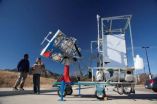(Press-News.org) Every 15-minute delay in delivering a clot-busting drug after stroke robs survivors of about a month of disability-free life, according to a new study in the American Heart Association journal Stroke.
On the other hand, speeding treatment by just one minute means another 1.8 days of healthy life, researchers said.
"'Save a minute; save a day' is the message from our study, which examined how even small reductions in treatment delays might benefit patients measurably in the long run," said Atte Meretoja, M.D., Ph.D., M.Sc., lead author of the study and associate professor of neurology at the University of Melbourne in Australia.
The clot-busting drug tissue plasminogen activator (tPA) to treat ischemic stroke, should be given within 4.5 hours of symptom onset. However, the sooner it's given, the better the outcome.
"Clot-busting treatment works equally well, irrespective of race, ethnicity or gender," Meretoja said. "Speedy restoration of blood flow to the brain is crucial for brain cell survival everywhere."
The world's fastest stroke services in Helsinki, Finland and Melbourne, Australia, take an average 20 minutes from hospital arrival to start of treatment, he said. Most American, Australian and European centers take 70-80 minutes.
"In this study, we wanted to quantify the importance of speed in the hope that concrete easy-to-relate-to figures will inspire medical services to measure and improve their game for the benefit of our stroke patients," Meretoja said.
Meretoja and colleagues used evidence from the combined major clot-busting trials reported to date. They applied those findings to 2,258 consecutive stroke patients from Australia and Finland to calculate what the patient outcomes would have been if they had been treated faster or slower.
They found:
For every minute the treatment could be delivered faster, patients gained an average 1.8 days of extra healthy life.
Although all patients benefited from faster treatment, younger patients with longer life expectancies gained a little more than older patients.
"In stroke treatment, every minute saved gives patients days of healthy life," Meretoja said. "Patients should never wait a single minute for stroke signs, such as face droop, arm weakness or speech disturbance, to go away. They should call for help immediately. Additionally, most emergency medical services and hospitals have the ability to reduce response and treatment delays significantly, and we have described how to do this."
The study's findings are generalizable to the U.S. population, he said.
F.A.S.T. is an easy way to remember the sudden signs of stroke. When you spot the signs, call 9-1-1 for help right away.
INFORMATION:
Co-authors are Mahsa Keshtkaran, M.Sc., Jeffrey L Saver, M.D.; Turgut Tatlisumak, M.D.; Mark W Parsons, M.D.; Markku Kaste, M.D.; Stephen M Davis, M.D.; Geoffrey A Donnan, M.D.; and Leonid Churilov, Ph.D. Author disclosures are on the manuscript.
The Australian National Health and Medical Research Council funded the study.
Learn how hospitals using the American Heart Association/American Stroke Association's quality improvement initiative Target: Stroke dramatically improved their stroke treatment times. Find a Target: Stroke Honor Roll hospital near you.
For the latest heart and stroke news, follow @HeartNews on Twitter.
For stroke science, follow the Stroke journal at @StrokeAHA_ASA
Statements and conclusions of study authors published in American Heart Association scientific journals are solely those of the study authors and do not necessarily reflect the association's policy or position. The association makes no representation or guarantee as to their accuracy or reliability. The association receives funding primarily from individuals; foundations and corporations (including pharmaceutical, device manufacturers and other companies) also make donations and fund specific association programs and events. The association has strict policies to prevent these relationships from influencing the science content. Revenues from pharmaceutical and device corporations are available at http://www.heart.org/corporatefunding.
Stroke survivors may lose month of healthy life for 15-minute delay in treatment
American Heart Association Rapid Access Journal Report
2014-03-13
ELSE PRESS RELEASES FROM THIS DATE:
Mexican-Americans suffer worse outcomes after stroke
2014-03-13
Mexican-Americans had worse neurologic, functional and cognitive outcomes 90 days after stroke compared to non-Hispanic whites, in a study reported in the American Heart Association journal Stroke.
Mexican-Americans have increased stroke risk, but lower risk of death compared to non-Hispanic whites. The new research suggests that prolonged survival is at the expense of increased disability.
The study's stroke participants were drawn from the Brain Attack Surveillance in Corpus Christi (BASIC) project conducted in a non-immigrant south Texas community. Researchers assessed ...
Religious beliefs of American Muslims influence attitudes toward organ donation
2014-03-13
American Muslims who interpret negative events in life as punishment from God are less likely to believe that donating organs after death is ethical than those with a more positive outlook, according to a survey conducted by researchers from the University of Chicago's Program on Medicine and Religion.
The study points to a complex relationship between attitudes toward organ donation and the Islamic faith. Previous research has shown that Muslims are less likely than other religious groups to believe organ donation is ethically justified, and suggests that religious values ...
Falls among elderly reduced by state program
2014-03-13
PITTSBURGH, March 13, 2014 – A low-cost program reduced falls in the elderly by 17 percent statewide, illustrating the value and effectiveness of using existing aging services, such as senior centers, in preventing falls, a University of Pittsburgh Graduate School of Public Health study determined.
Pitt Public Health researchers followed nearly 2,000 older Pennsylvanians between 2010 and 2011 to determine the effectiveness of the state's Healthy Steps for Older Adults, a voluntary fall-prevention program. Results of the study, funded by the U.S. Centers for Disease Control ...
Simple EMG classification can improve outcome of nerve transfer surgery
2014-03-13
A study by researchers at Hospital for Special Surgery (HSS) finds that electromyography (EMG) testing to determine the quality of donor nerves can improve the outcome of nerve transfer surgery to restore function in patients with a brachial plexus injury. EMG is a sophisticated test used to objectively measure muscle and nerve function.
The paper, "Does Pre-operative Donor Nerve Electromyography Predict Nerve Transfer Outcomes?," will be presented at the annual meeting of the American Academy of Orthopaedic Surgeons on March 13 in New Orleans.
"Our study found that ...
Innovative solar-powered toilet developed by CU-Boulder ready for India unveiling
2014-03-13
A revolutionary University of Colorado Boulder toilet fueled by the sun that is being developed to help some of the 2.5 billion people around the world lacking safe and sustainable sanitation will be unveiled in India this month.
The self-contained, waterless toilet, designed and built using a $777,000 grant from the Bill & Melinda Gates Foundation, has the capability of heating human waste to a high enough temperature to sterilize human waste and create biochar, a highly porous charcoal, said project principal investigator Karl Linden, professor of environmental engineering. ...
Husband's health and attitude loom large for happy long-term marriages
2014-03-13
A husband's agreeable personality and good health appear crucial to preventing conflict among older couples who have been together a long time, according to a study from University of Chicago researchers.
The report found that such characteristics in wives play less of a role in limiting marital conflict, perhaps because of different expectations among women and men in durable relationships.
"Wives report more conflict if their husband is in poor health," said the study's lead author, James Iveniuk, PhD candidate in the Department of Sociology. "If the wife is in poor ...
Nanoscale optical switch breaks miniaturization barrier
2014-03-13
An ultra-fast and ultra-small optical switch has been invented that could advance the day when photons replace electrons in the innards of consumer products ranging from cell phones to automobiles.
The new optical device can turn on and off trillions of times per second. It consists of individual switches that are only one five-hundredths the width of a human hair (200 nanometers) in diameter. This size is much smaller than the current generation of optical switches and it easily breaks one of the major technical barriers to the spread of electronic devices that detect ...
CU-Boulder-led study on lunar crater counting shows crowdsourcing is accurate tool
2014-03-13
If Galileo was still alive and kicking, he might want to take a selfie with some of the thousands of citizen scientists all around the world for their surprisingly accurate work of counting craters on the pock-marked moon.
A new study led by the University of Colorado Boulder showed that as a group, volunteer counters who examined a particular patch of lunar real estate using NASA images did just as well in identifying individual craters as professional crater counters with five to 50 years of experience. And Galileo, who was observing the craters some 400 years ago with ...
Bioscientists develop 'grammar' to design useful synthetic living systems
2014-03-13
Researchers at Virginia Tech and the Massachusetts Institute of Technology have used a computer-aided design tool to create genetic languages to guide the design of biological systems.
Known as GenoCAD, the open-source software was developed by researchers at the Virginia Bioinformatics Institute at Virginia Tech to help synthetic biologists capture biological rules to engineer organisms that produce useful products or health-care solutions from inexpensive, renewable materials.
GenoCAD helps researchers in the design of protein expression vectors, artificial gene networks, ...
Fish species unique to Hawaii dominate deep coral reefs in Northwestern Hawaiian Islands
2014-03-13
Deep coral reefs in Papahanaumokuakea Marine National Monument (PMNM) may contain the highest percentage of fish species found nowhere else on Earth, according to a study by NOAA scientists published in the Bulletin of Marine Science. Part of the largest protected area in the United States, the islands, atolls and submerged habitats of the Northwestern Hawaiian Islands (NWHI) harbor unprecedented levels of biological diversity, underscoring the value in protecting this area, scientists said.
Hawaii is known for its high abundance of endemic species – that is, species ...
LAST 30 PRESS RELEASES:
Novel camel antimicrobial peptides show promise against drug-resistant bacteria
Scientists discover why we know when to stop scratching an itch
A hidden reason inner ear cells die – and what it means for preventing hearing loss
Researchers discover how tuberculosis bacteria use a “stealth” mechanism to evade the immune system
New microscopy technique lets scientists see cells in unprecedented detail and color
Sometimes less is more: Scientists rethink how to pack medicine into tiny delivery capsules
Scientists build low-cost microscope to study living cells in zero gravity
The Biophysical Journal names Denis V. Titov the 2025 Paper of the Year-Early Career Investigator awardee
Scientists show how your body senses cold—and why menthol feels cool
Scientists deliver new molecule for getting DNA into cells
Study reveals insights about brain regions linked to OCD, informing potential treatments
Does ocean saltiness influence El Niño?
2026 Young Investigators: ONR celebrates new talent tackling warfighter challenges
Genetics help explain who gets the ‘telltale tingle’ from music, art and literature
Many Americans misunderstand medical aid in dying laws
Researchers publish landmark infectious disease study in ‘Science’
New NSF award supports innovative role-playing game approach to strengthening research security in academia
Kumar named to ACMA Emerging Leaders Program for 2026
AI language models could transform aquatic environmental risk assessment
New isotope tools reveal hidden pathways reshaping the global nitrogen cycle
Study reveals how antibiotic structure controls removal from water using biochar
Why chronic pain lasts longer in women: Immune cells offer clues
Toxic exposure creates epigenetic disease risk over 20 generations
More time spent on social media linked to steroid use intentions among boys and men
New study suggests a “kick it while it’s down” approach to cancer treatment could improve cure rates
Milken Institute, Ann Theodore Foundation launch new grant to support clinical trial for potential sarcoidosis treatment
New strategies boost effectiveness of CAR-NK therapy against cancer
Study: Adolescent cannabis use linked to doubling risk of psychotic and bipolar disorders
Invisible harms: drug-related deaths spike after hurricanes and tropical storms
Adolescent cannabis use and risk of psychotic, bipolar, depressive, and anxiety disorders
[Press-News.org] Stroke survivors may lose month of healthy life for 15-minute delay in treatmentAmerican Heart Association Rapid Access Journal Report


